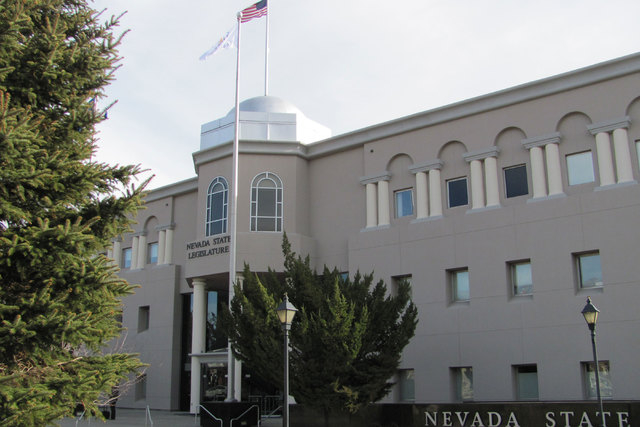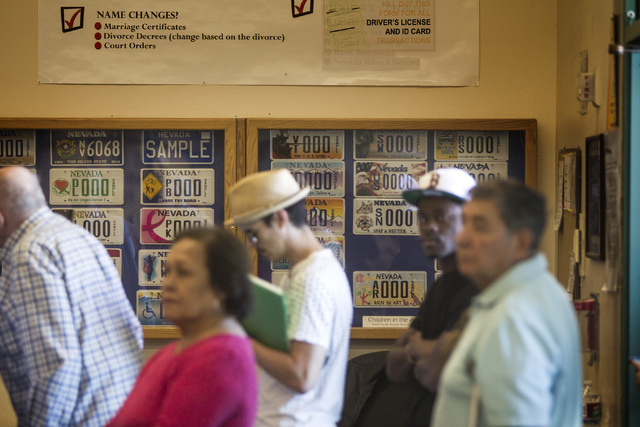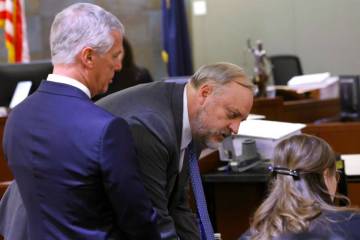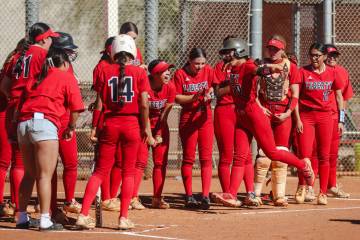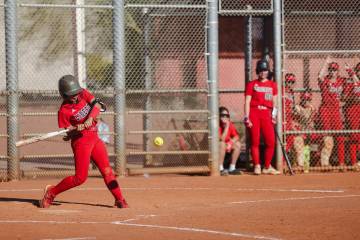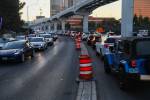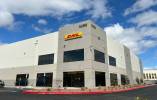Following legislative session, here come the tax hikes
CARSON CITY — A few pennies here, a couple of dollars — or millions — there.
From higher cigarette taxes, entertainment levies and the state’s first gross receipts tax on commerce, Nevada businesses and residents will pay more under tax measures approved by the 2015 Legislature to fund Gov. Brian Sandoval’s $7.3 billion general fund budget.
It’s too early to say how far Nevada consumers will have to dig into their pockets. But it’s a safe bet things will cost more under the levies, most of which take effect July 1.
“There are too many factors to be able to predict with any certainty how much the impact is going to be,” said Bryan Wachter of the Retail Association of Nevada, a trade group that opposed Sandoval’s gross receipts tax.
He said a lot will depend on an individual’s lifestyle and buying habits but added, “Certainly through consumer goods and utility providers, there will be an increase.”
The biggest component of the tax package — and a first in state history — is Sandoval’s gross receipts tax on business revenue. The second-term Republican won a hard-fought battle to get his plan through a tax-averse Assembly, a move Sandoval said will provide the state a more stable revenue stream with enough elasticity to expand as the state’s economy and needs grow.
“We’ve structured a new revenue policy and budget that should stand the test of time,” Sandoval told reporters Tuesday, the day after the 2015 legislative session adjourned. That came after lawmakers passed his two-year spending plan and $1.1 billion package of new and extended general fund taxes to pay for it.
Going forward, he said, “there will be an opportunity for once to have a session where you’re not having this knock-down, drag-out fight on the budget and be able to focus on other issues.”
All in all, “new revenue” is anticipated to generate $754 million over the upcoming biennium that begins July 1.
COMMERCE TAX
Sandoval’s new “commerce tax,” to be imposed on the biggest companies doing business in the state, is estimated to raise $229 million.
Tax rates will vary depending on industry type, and the first $4 million in revenue is exempt. Administration officials say that exemption will exclude more than 90 percent of Nevada businesses from paying any tax and capture revenue from big companies that have skated on taxes because they are headquartered elsewhere or have few if any Nevada-based employees.
Wholesale and retail giants such as Wal-Mart, car manufacturers, pharmaceutical and telecom companies will be assessed the commerce tax based on their Nevada-generated revenue. The tax applies to any type of business that generates $4 million or more in annual revenue.
THE MBT
The modified business tax assessed on an employer’s payroll was first enacted in 2003 after the last big tax fight in the Legislature. It was tweaked over the years to raise or lower rates and threshold exemptions.
Companies with large numbers of employees such as resort hotels are hit the hardest.
Under the tax plan approved by lawmakers, the MBT general business rate increases to 1.475 percent from 1.17 percent. The exemption was reduced from the $85,000 per quarter to $50,000, meaning more companies will pay it. Mining and financial institutions will pay a 2 percent rate.
But businesses subject to the new commerce tax will be able to deduct half of what they pay in commerce taxes from their MBT obligation.
The higher MBT tax is projected to add $190.4 million to state coffers.
BUSINESS LICENSE FEES
For a long time Nevada businesses paid a flat $25 for an annual state license. It jumped to $100 in 2003, and in 2009 was raised to $200.
Sandoval’s initial proposal to tie business license fees to industry categories and gross receipts passed the Senate but fell flat in the Assembly. The governor and legislative leaders went back to the drawing board and, in a victory for small businesses, the state’s annual $200 business license fee was left intact for most. But corporations, many of which have no presence in the state but incorporate here to take advantage of Nevada law, will see a jump to $500.
New revenue from business licenses is projected to bring in $81.4 million, a figure that includes a 13 percent “leaving” factor of corporations that might take their filing fee elsewhere.
CIGARETTES
Smokers are about to pay a lot more for a pack of cigarettes, currently averaging $6.15. Lawmakers approved a $1-per-pack increase in cigarette taxes, bringing the total to $1.80.
The increase brings Nevada’s tax rate to 18th in the nation. New York has the highest tax at $4.35 per pack, while Virginia is lowest at 30 cents. California taxes cigarettes at 87 cents.
Fiscal analysts say despite smokers who might quit because of the price hike, the new tax will add $192.3 million to the general fund.
THE UBER FACTOR
Ride-hailing companies such as Uber and Lyft that connect riders with drivers through smartphone apps were legalized by lawmakers in what was one of the heaviest-lobbied issues of the session. That approval, however, came with a price tag that will be paid not only by Uber users but taxicab and limousine riders as well.
The law authorizing ride-hailing firms included a 3 percent excise tax on all ride fares. Budget analysts estimate the revenue will generate about $36 million. The first $5 million raised each year is mandated to the state highway fund, with the rest going to the general fund.
The tax would add about 60 cents to a $20 fare to take a taxi from McCarran International Airport to the Strip.
Revenue from the excise tax is also being counted on to fully fund a new medical school at the University of Nevada, Las Vegas.
Drivers for ride-hailing companies also will be required to obtain a state business license.
DMV UPGRADES
The Department of Motor Vehicles will finance a $109 million computer system upgrade with a $1 fee tacked on to all DMV transactions, including vehicle registration and driver’s license renewals.
The system will take five years to bring online.
Legislators also approved a new DMV office and added dozens of new positions for the agency, all intended to cut down on long customer wait times, especially in Southern Nevada.
SUNRISE, NO SUNSET
The “sunset” taxes were first imposed in 2009 when Nevada was in the throes of recession, unemployment soared to around 14 percent and the state’s booming housing market imploded. Originally pitched as a stopgap measure to keep the doors of state government open, they were extended in 2011 and 2013. Sandoval said it was time to end the charade and make permanent a $380 million revenue stream.
Besides retaining the annual business license fee rate, the sunset taxes included a government services tax tied to vehicle registrations. The tax, enacted in 2009, slowed the depreciation of vehicles, meaning motorists pay higher annual registration fees. That tax generates $63 million a year, and all of it will go to the state general fund next year. The state highway fund will receive half the revenue in 2017 and all of it in 2018.
A 0.35 percent boost in the state portion of sales taxes, which were raised from 2.25 percent to 2.6 percent six years ago, also becomes permanent. The $377 million raised goes directly to schools and is separate from the $1.1 billion in general fund taxes. The fractional increase adds $3.50 in taxes on a $1,000 purchase.
Total sales tax rates vary by county, with Clark County having the highest at 8.1 percent. For a $1,000 purchase, the total sales tax would be $81.
Other components of the sunset taxes, such as business license fees and modified business tax increases, were incorporated in the overall revenue plan.
LIVE ENTERTAINMENT
Nevada’s live entertainment tax was overhauled to make it easier to administer and to close loopholes that allowed some big events to go untaxed.
The bottom line: Tickets for a wide variety of events, including the annual Burning Man Festival in Northern Nevada and Electric Daisy Carnival in Las Vegas, which run hundreds of dollars, likely will cost more.
Previously, the tax rate ranged from 5 to 10 percent depending on the size of the venue. Sometimes food and beverage sales counted toward the tax liability, other times not. Big outdoor events and concerts were exempt, unless they were held on casino property.
The new law imposes a 9 percent tax on admissions, and even includes escort services — though not prostitution.
The live entertainment tax brought in $154 million in 2014, and though architects of the new law say it was designed to be revenue neutral, a projection on collections to reflect the changes has not yet been made.
That tax does not take effect until Oct. 1, so this year’s Burning Man and Electric Daisy Carnival are not affected. The organizations, however, have said they are concerned about the tax and what it will mean to their events if they stay in Nevada.
SCHOOL BONDS
Though not part of Sandoval’s tax plan, lawmakers approved and Sandoval signed a bill allowing Clark and Washoe counties to roll over school construction bonding authority for 10 years. In 1998 voters in Clark County raised property taxes by 55 cents per $100 of assessed valuation for a school construction plan.
Voters in Clark County rejected a pay-as-you-go school construction tax increase in 2012.
The law allows the districts to roll over bonding authority for 10 years without a vote. Property owners will not see a tax increase under the measure, but their property tax will not drop as it otherwise would have.
The county’s average property tax rate is now $3.06 per $100 of assessed valuation.
Clark County School District officials said the rollover would allow the district to quickly raise $850 million to address school construction and renovation needs. Over 10 years, the measure would generate $3.6 billion, just over half of the $7 billion in estimated need.
The district said it would begin by building 12 new schools to open by 2017 and 2018, adding capacity to 40 existing schools and replacing two of the oldest elementary schools.
Contact Sandra Chereb at schereb@reviewjournal.com or 775-687-3901. Find her on Twitter: @SandraChereb

RELATED STORIES
The continuously updated, end-of-days Legislature blog!
School bills: Some head to governor, others await legislative action
Sandoval tweaks tax plan to squeeze more votes out of Assembly
Senate to consider bill funding police body cameras
Sandoval signs legislation clearing way for Uber, Lyft
Gov. Sandoval signs bill allowing slot machines with skill factor
Bill calling for annual Nevada legislative session clears key Senate panel
See all of our coverage: 2015 Nevada Legislature.



